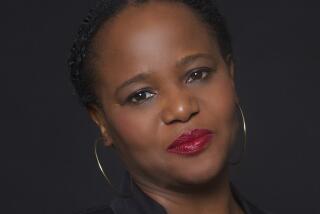History’s odd women out
- Share via
Literary critic Rosemary Dinnage was packing for a move and sorting her files when her life spilled out across her knees; book reviews, if you write them for a long time, amount to autobiography. What do I sniff out? Who do others think I am? She loved adventurous, oddball women at risk of being erased or lied about. Over four decades, writing mainly in the New York Review of Books and the Times Literary Supplement, she got to be known by editors for this propensity. “[I]f it’s about misery, send it to Dinnage -- it’s her specialty,” she jokes in the introduction to her witty, erudite collection “Alone! Alone!” “Frustration, bereavement, early death, depression, tragedy, and general gloom all came my way.... In addition, I have always liked weirdness, oddity, outsiderism, nonconformity.”
She cautions that she’s not conversant with “women’s studies” and “gender politics.” Actually, she sometimes is. She merrily ferrets out contempt for women in men who’ve been idealized. Winston Churchill, she reminds us, strongly opposed women’s suffrage. She quotes Andre Malraux acting the snake with talented Clara Malraux: “Better to be my wife than a second-rate writer.” Dinnage, however, doesn’t note that men and women are frequently alone for different reasons -- that men often flee domesticity, while women are typically punished with aloneness for acting pretty much like men. What, in a culture that questions most norms, might still be considered odd and outside? Dinnage doesn’t wonder, but her compilation suggests an answer with regard to women: sexual aggression and wolfish wanting.
Her essay collection profiling nearly 30 figures isn’t uniformly marvelous, and some of her categories -- “Partners and Muses,” “Seers,” “Exotics” -- aren’t especially illuminating. She crowds Clementine Churchill, Bloomsburian Ottoline Morrell, Dora Russell (wife of Bertrand) and Olive Schreiner under the muse umbrella, though these women’s claims to notability differ considerably. Churchill was indeed an adhesive mate, but Schreiner is surely more significant for her writing, feminism and views on South African politics than for inspiring sexuality pioneer Havelock Ellis.
Some women interest Dinnage more than others. But even slighter pieces are enjoyable, Dinnage’s authority piping up in her irreverence and conversational ease. Pondering the extravagance of spiritualist Madame Helena Petrovna Blavatsky’s frauds, she quips, “[I]f all she needed was to keep afloat financially, there must have been an easier way to do so than by founding a new religion -- giving Russian lessons, for instance, or being a cleaning lady.” Grappling with Barbara Pym, she offers that her “flavor, whether you like it or find it insipid, is almost impossible to pin down; it makes critical adjectives look gross and clumsy, like big hands in a doll’s house.”
The standout pieces are not about shadows and almosts, however, but about women who used aloneness as a lab: painter Gwen John, poet Stevie Smith, philosopher Simone Weil, Isak Dinesen, Rebecca West and Katherine Mansfield. Consciously or not, Dinnage studies these models for how to be a female artist. In each case, she locates sex as a point against which the rest of the life pivots, whether sex is avoided or embraced, whether it functions as a hypnotizing stroke or a kiss of death.
She’s instructed by West and Dinesen, who, over long, erotically engaged lives, tried to separate sex from the meanings attached to it about who we are and how we should live. She’s fascinated by Weil’s ambivalent connection to being embodied -- on one hand hating to be touched and yet yearning “to experience rather than to cerebrate.” Weil’s blindness about herself, however, irks Dinnage in the extreme. Against the dying woman’s verdict on her existence -- “I am a badly cut-off piece of God” -- she levels Nietzsche’s brilliant insight into the egotism of self-loathing: “[It is the] meanest of conspiracies, the conspiracy of those who suffer against those who succeed.” Dinnage continues quoting the German philosopher: “In this swamp-soil of self-contempt, every poisonous weed flourishes, and all so small, so secret, so dishonest, and so sweetly rotten.”
Dishonesty is what Dinnage can least abide. Those who surmount it and eyeball their vanities -- including their illusions about death -- earn her warmest regard. Kisses are blown to Smith for her Swiftian proposal that, to lend children a taste for life, they ought be offered, as early as possible, the option of suicide. Dinnage applauds Mansfield for fighting her way through layers of masks and a host of phony voices to emerge before her death still and clear-eyed: “Now that the romantic haze wafted around her by [her husband, editor and critic John Middleton] Murry after her death has long since dissipated, we can see and admire the real struggle put up by this wretchedly unlucky girl: a struggle for more honesty both in living and writing (compare the way that Lawrence, incomparably more important as a writer, let illness sour rather than strengthen him).”
Virginia Woolf was friends with Mansfield and recorded the transformation in her diary, observing at the same time her own solipsism. How to escape it? That’s the question driving all of Dinnage’s essays. Having journeyed so long with these women, she offers Woolf’s self-reprimand as her most valuable souvenir: “The dream is too often about myself. To forget this, & to forget one’s own sharp absurd little personality, reputation & the rest of it, one should read; see outsiders; think more; write more logically; above all be full of work; & practise anonymity.” Dinnage has practiced well. *
More to Read
Sign up for our Book Club newsletter
Get the latest news, events and more from the Los Angeles Times Book Club, and help us get L.A. reading and talking.
You may occasionally receive promotional content from the Los Angeles Times.






